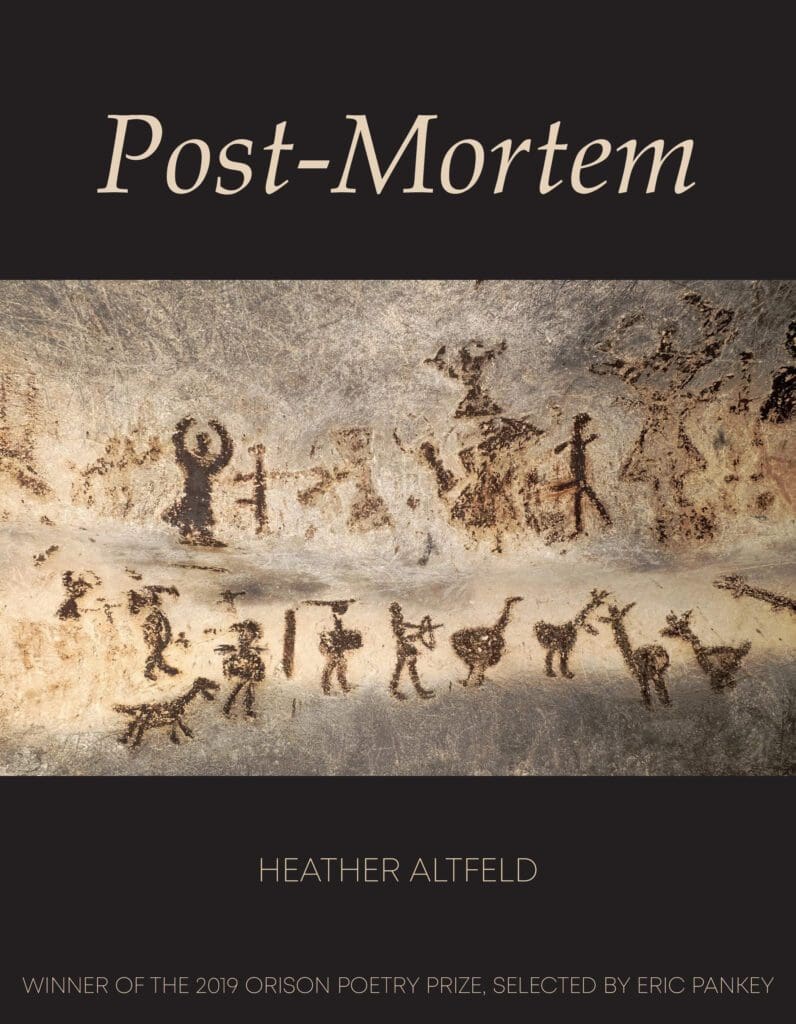There is a custom in the Jewish tradition called Kaddish, which includes saying aloud the names of the dead. The idea is that they live again for that brief moment when their name rings in the air. I thought of this while reading Heather Altfeld’s new book, Post-Mortem (100 pages; Orison Books), which details the complexity of loss we all know about but rarely speak of: the death of languages of indigenous peoples, of species, of the earth.
Though the tone of the book is elegiac and it’s not light reading, the specificity and detail in these poems often make them feel more like odes. Altfeld’s background in anthropology is on display, as well as her love of the planet and what’s lost and her quirky sense of humor. The word choice alone lifts these poems, engaging the reader. Take, for example, “The Apocalypse Club,” which opens:
Let’s face it, the end of days titillates
as well as any good porn…
Your first crush was the one
you had on the whole world,
its trilobites and its rose quartz,
the pewter soldiers who seemed to sprout
from the mud…
The way these inclusive and eclectic catalogs unfold is one of the delights of this book. The voice is unique, both abrasive and tender. Several poems address Jewish rituals, not just Kaddish, but also Taharah, the preparation of a dead body for burial. This poem exemplifies Altfeld’s ability to start from the grim, possibly gruesome realities of death, and turn toward hope for renewal. It starts:
I had not imagined that she would be frozen,
or that her teeth would be so small—little shards,
mouse-teeth, grinding ninety-three years on carp
and seltzer…
and ends:
…that we are pure,
like my baby daughter, held up by a nurse
after her first washing, terrifically pink
and ready to live, all of her new cells
clamoring for the pipes,
where they were washed down
and recycled and reclaimed with the rain,
the cold, fresh little darlings.
There is also a wonderful mixing of the sacred and the profane, as in “Jerking Off in the Afterlife,” with references to Egyptian tomb art, or “Pliney’s Traveling Apothecary Visits the Bleeker St. Clinic,” rich with archaic detail in a modern setting.
These poems address the larger losses, the ones we read about and don’t know how to process. They don’t take the explicit form of an obituary (in spite of their titles) but grow and change as they progress. A few of the selections in the book are essays. “Obituary for Snow,” “Earth Obituary,” and “Obituary for Dead Languages” are profound and moving and blur the line between poetry and nonfiction. Here is the final paragraph of “Obituary for Dead Languages,” in which she writes how she can rely on a 1951 guide for speaking “the endangered language of Tongan for both teaching and learning the most elemental phenomena of the world.”
Each English phrase is compressed into one easy-to-remember Tongan word. All you have to do is repeat after the tone. The animals bite. My sheep’s hut has fallen into disrepair. My goat has aborted. Wild boars have sadly depleted our crops. The thing is dead. The people have died. Our humanity is finished.
The selection of phrases is part of the genius of this book, and what saves the reader from despair. Even if our humanity is finished and the people have died, the earthy references to sheep and goats and crops bring to mind life in its perfect simplicity.
Altfeld is a writer of long poems, rich with complex sentences and historical detail, humor, and longing. Because the poems build, image after image, it’s hard to capture their spirit in a review. They include detailed anthropological information, scientific facts, Kabalistic imagery, and references to children’s stories, always fresh. Anyone who has read Goodnight Moon will recognize this cadence from “903,” a poem about the many ways death can find us:
Good night, tiny rice airplane
with the inky child inside.
Good night, empty sneakers.
Good night, terrible rags
and wool soaked in thorns
and the glass of milk somewhere
with a tender hair besides.
Somewhere, someone is fasting
to prevent the ordinary lives of disaster.
Somewhere a light rain
is falling on a new grave.
The way the lines play off the calming cadence of the nursery story so as to bring us up against the perils of the real world is a typical Altfeld move. She is able to create for us a complex longing for the world we love, even as it vanishes.

